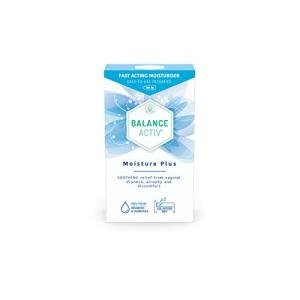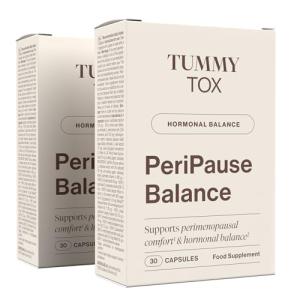Vaginal dryness is one of the most common and often least talked about symptoms of perimenopause. It can affect intimacy, comfort, and confidence, yet many women feel hesitant to bring it up. The good news is that support and effective treatments are available, both through the NHS and over-the-counter solutions.
This article explains why dryness occurs, how it feels, and what can help – from natural remedies to medical treatments.
Why Vaginal Dryness Happens in Perimenopause
During perimenopause, oestrogen levels begin to fluctuate and gradually decline. Oestrogen helps keep the vaginal tissue elastic, moist, and healthy. When levels drop, changes in the vaginal lining occur:
-
The tissue becomes thinner and less elastic
-
Natural lubrication decreases
-
The vagina may feel dry, sore, or itchy
This is medically known as genitourinary syndrome of menopause (GSM). It is a standard but treatable part of the hormonal transition.
Symptoms of Vaginal Dryness
Dryness can feel different for each woman. Common symptoms include:
-
A persistent dry or tight feeling in the vagina
-
Itching, burning, or discomfort
-
Pain during sex (dyspareunia)
-
Light spotting after intercourse
-
Increased urinary frequency or urgency
Even mild dryness can affect quality of life, so it is essential to address it rather than ignore it.
Balance Activ Menopause Moisture Pessaries for Vaginal Dryness
Relieve vaginal dryness and restore comfort with these easy-to-use moisture pessaries
Product information
$20.06 $10.04
Product Review Score
4.8 out of 5 stars
132 reviewsProduct links
What Helps: Treatments and Options
There is no single best solution – what works depends on your health, comfort, and personal preference. Options include:
1. Vaginal Moisturisers and Lubricants
-
Moisturisers (used regularly, not just during sex) help restore hydration to the vaginal lining.
-
Lubricants reduce friction during intimacy.
-
Available in pharmacies, supermarkets, and online. Look for products labelled as vaginal moisturisers rather than standard body lotions.
(Example: popular brands in the UK include YES, Sylk, and Replens.)
2. Vaginal Oestrogen Treatments
-
Prescribed by a GP or menopause specialist.
-
Available as pessaries, creams, gels, or a vaginal ring.
-
Very low doses of oestrogen act locally rather than throughout the body.
-
Usually safe for most women and effective in improving tissue health, elasticity, and comfort.
NHS guidance recognises vaginal oestrogen as a first-line treatment for ongoing dryness.
3. Systemic HRT (Hormone Replacement Therapy)
-
Tablets, patches, or gels that replace oestrogen throughout the body.
-
It may be suitable if you also experience hot flashes, night sweats, or mood symptoms in addition to dryness.
-
Discuss risks and benefits with your GP or menopause clinic.
Perimenopause Support Supplement with Saffron & Vitamins
Feel balanced and energized with our gentle blend designed to tackle perimenopause challenges
Product information
$45.48
Product Review Score
4.79 out of 5 stars
28 reviewsProduct links
4. Non-Hormonal Remedies and Lifestyle Support
Some women prefer or need to avoid hormones. Helpful approaches may include:
-
Natural remedies: coconut oil or vitamin E suppositories (though evidence is mixed, and they are not suitable for everyone).
-
Pelvic floor exercises: support circulation and vaginal tone.
-
Regular sexual activity: increases blood flow and may improve comfort.
-
Avoiding irritants: fragranced soaps, bubble baths, and perfumed wipes can worsen dryness.
When to See a Doctor
Speak with your GP or menopause clinic if:
-
Vaginal dryness is affecting daily life or intimacy
-
Over-the-counter moisturisers have not helped
-
You experience bleeding after sex or new urinary symptoms
You do not need to suffer in silence – effective treatment is available and can make a real difference.
FAQs About Perimenopause Vaginal Dryness
What is the best treatment for vaginal dryness?
Vaginal oestrogen prescribed by a GP is often the most effective. Regular use of vaginal moisturisers can also help.
Are there natural remedies for vaginal dryness?
Yes, some women find relief with natural oils, such as coconut oil or vitamin E. However, these are not regulated medical treatments, so it is always best to check with your doctor first.
Is vaginal dryness a sign of menopause?
Yes, it is a common perimenopause and menopause symptom due to falling oestrogen levels.
Can the NHS help with vaginal dryness?
Yes. Your GP can prescribe vaginal oestrogen, and some clinics offer menopause-specific support.
Summary
Perimenopause vaginal dryness is common but highly treatable. Moisturisers, lubricants, and vaginal oestrogen treatments are proven options. Lifestyle changes and natural remedies may also help, but it is essential to get personalised advice from your GP.




